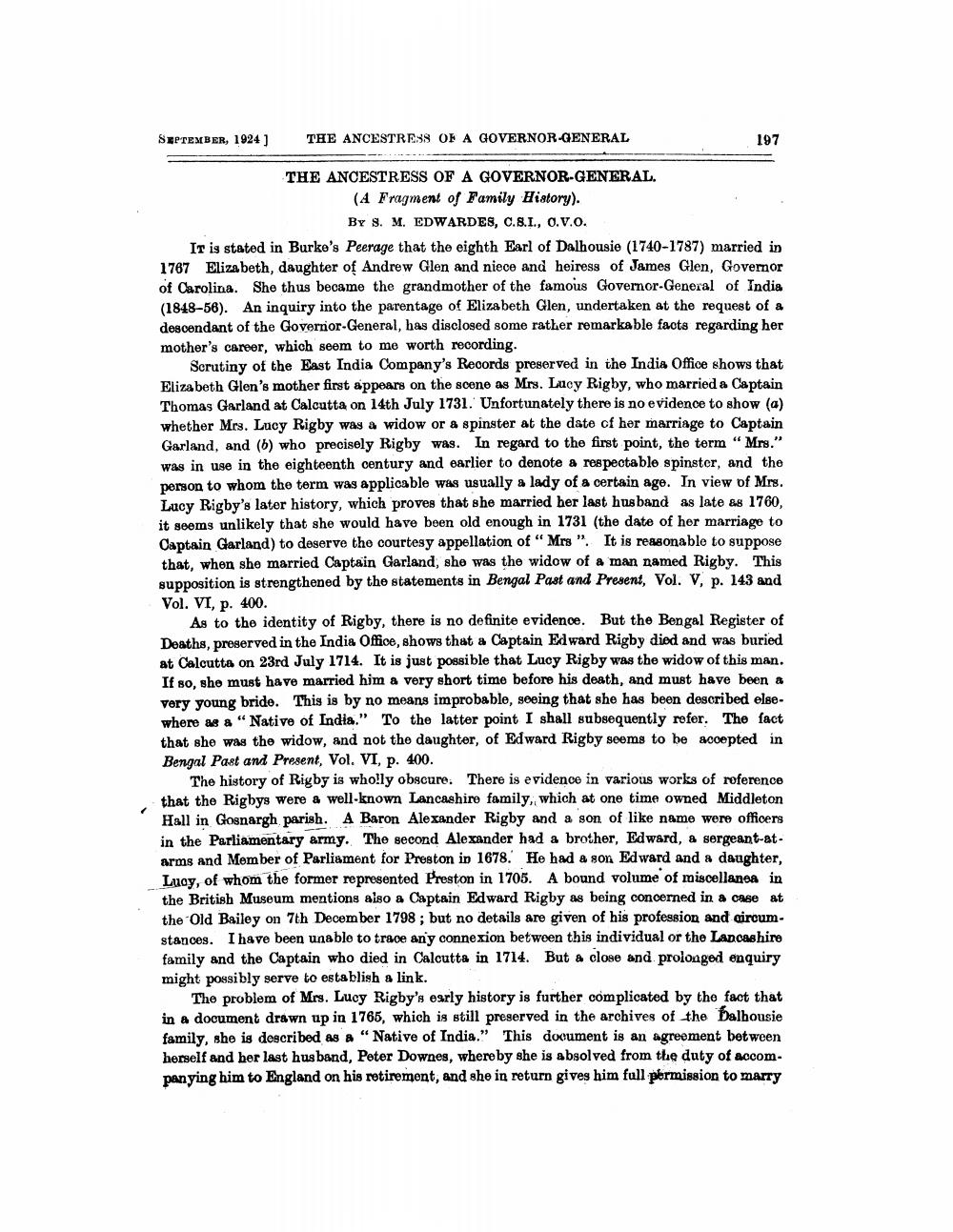________________
SEPTEMBER, 1924]
THE ANCESTRESS OF A GOVERNOR-GENERAL
THE ANCESTRESS OF A GOVERNOR-GENERAL. (A Fragment of Family History).
By S. M. EDWARDES, C.S.I., O.v.o.
197
It is stated in Burke's Peerage that the eighth Earl of Dalhousie (1740-1787) married in 1767 Elizabeth, daughter of Andrew Glen and niece and heiress of James Glen, Governor of Carolina. She thus became the grandmother of the famous Governor-General of India (1848-56). An inquiry into the parentage of Elizabeth Glen, undertaken at the request of a descendant of the Governor-General, has disclosed some rather remarkable facts regarding her mother's career, which seem to me worth recording.
Scrutiny of the East India Company's Records preserved in the India Office shows that Elizabeth Glen's mother first appears on the scene as Mrs. Lucy Rigby, who married a Captain Thomas Garland at Calcutta on 14th July 1731. Unfortunately there is no evidence to show (a) whether Mrs. Lucy Rigby was a widow or a spinster at the date of her marriage to Captain Garland, and (b) who precisely Rigby was. In regard to the first point, the term "Mrs." was in use in the eighteenth century and earlier to denote a respectable spinster, and the person to whom the term was applicable was usually a lady of a certain age. In view of Mrs. Lucy Rigby's later history, which proves that she married her last husband as late as 1760, it seems unlikely that she would have been old enough in 1731 (the date of her marriage to Captain Garland) to deserve the courtesy appellation of "Mrs". It is reasonable to suppose that, when she married Captain Garland, she was the widow of a man named Rigby. This supposition is strengthened by the statements in Bengal Past and Present, Vol. V, p. 143 and Vol. VI, p. 400.
As to the identity of Rigby, there is no definite evidence. But the Bengal Register of Deaths, preserved in the India Office, shows that a Captain Edward Rigby died and was buried at Calcutta on 23rd July 1714. It is just possible that Lucy Rigby was the widow of this man. If so, she must have married him a very short time before his death, and must have been a very young bride. This is by no means improbable, seeing that she has been described elsewhere as a "Native of India." To the latter point I shall subsequently refer. The fact that she was the widow, and not the daughter, of Edward Rigby seems to be accepted in Bengal Past and Present, Vol. VI, p. 400.
The history of Rigby is wholly obscure. There is evidence in various works of reference that the Rigbys were a well-known Lancashire family, which at one time owned Middleton Hall in Gosnargh parish. A Baron Alexander Rigby and a son of like name were officers in the Parliamentary army. The second Alexander had a brother, Edward, a sergeant-atarms and Member of Parliament for Preston in 1678. He had a son Edward and a daughter, Lucy, of whom the former represented Preston in 1705. A bound volume of miscellanea in the British Museum mentions also a Captain Edward Rigby as being concerned in a case at the Old Bailey on 7th December 1798; but no details are given of his profession and circumstances. I have been unable to trace any connexion between this individual or the Lancashire family and the Captain who died in Calcutta in 1714. But a close and prolonged enquiry might possibly serve to establish a link.
The problem of Mrs. Lucy Rigby's early history is further complicated by the fact that in a document drawn up in 1765, which is still preserved in the archives of the Dalhousie family, she is described as a "Native of India." This document is an agreement between herself and her last husband, Peter Downes, whereby she is absolved from the duty of accompanying him to England on his retirement, and she in return gives him full permission to marry




